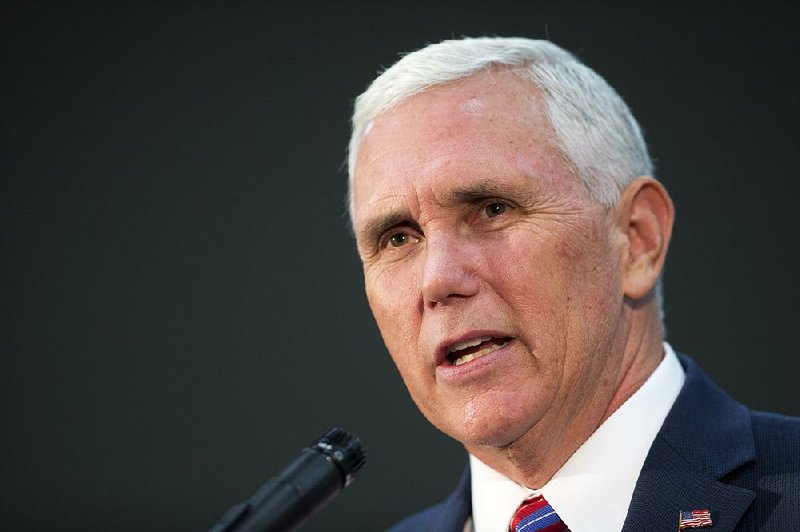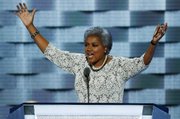WASHINGTON -- Surrogates for Donald Trump backed away Sunday from a primary element of his immigration policy, a proposal to boot the roughly 11 million people living in the U.S. illegally, with the help of a "deportation force."
FULL ELECTION COVERAGE
They also sought to shift the focus to whether Democratic presidential nominee Hillary Clinton crossed ethical lines during her tenure as secretary of state by talking with people outside the government who had contributed to her family's philanthropic foundation.
On immigration, Gov. Mike Pence of Indiana, Trump's running mate on the Republican presidential ticket, would not affirm Sunday that their administration would expel all of the people who are in the U.S. illegally.
Asked if Trump still sought a "deportation force," which he called for last year, Pence said Trump was speaking of "a mechanism, not a policy."
He also backed away from Trump's opposition to automatic citizenship for children born in the United States to illegal migrants.
That, he said, "is a subject for the future."
Native-born children of migrants, even those living illegally in the U.S., have been automatically considered American citizens since the adoption of the 14th Amendment in 1868.
On CNN's State of the Union, Pence promised that Trump would soon lay out a detailed immigration plan, though Trump has emphasized the issue for more than a year. Trump last week suggested a "softening" toward illegal aliens, then seemed to reverse himself under criticism from some conservatives.
Added Trump's campaign manager, Kellyanne Conway: "The softening is more approach than policy," adding that on immigration, Trump "wants to find a fair and humane way."
"He is not talking about a deportation force," she said on Fox News Sunday.
On Sunday evening, Trump posted on Twitter that he will make a "major speech" about the issue in Arizona on Wednesday.
The speech was initially set for last week in Colorado but was pushed back as Trump and his team wrestled over the details of what he would propose. There has been debate within his campaign about illegal aliens who haven't committed crimes beyond their immigration offenses.
Pence, Conway and other surrogates said the main tenets of Trump's immigration plan still will include building a wall along the southern U.S. border and making Mexico pay for it, offering no path to legalization or citizenship for people in the U.S. illegally, and implementing stronger border enforcement.
Trump has focused lately on deporting people who are in the U.S. illegally and who have committed crimes. But who Trump considers a criminal remained unclear Sunday.
Trump stand-ins, including New Jersey Gov. Chris Christie, spoke similarly.
Also on Sunday, Trump's campaign announced its biggest ad buy to date -- upward of $10 million on commercials airing over the next week.
The campaign expects the ads to air as soon as today in nine swing states: Ohio, Pennsylvania, North Carolina, Florida, New Hampshire, Virginia, Iowa, Colorado and Nevada. Mitt Romney, the 2012 Republican nominee, lost eight of those states.
Trump began his advertising campaign earlier this month but previously had spent only about $5 million. Clinton has spent more than $77 million on television and radio advertising since she clinched her party's nomination in June, and she has largely targeted voters in battleground states, according to Kantar Media's political ad tracker.
Meetings dispute
For Clinton, past meetings with people who contributed to the Clinton Foundation continued to be a source of contention on Sunday.
Democratic National Committee Chairman Donna Brazile defended the meetings, saying it's not unusual for supporters and activists to seek out private meetings and that there's no evidence Clinton did any favors on behalf of foundation donors.
"When Republicans meet with their donors, with their supporters, they call it a meeting," she said on CBS' Face the Nation. "When Democrats do that, they call it a conflict. It's not pay-to-play, unless somebody actually gave someone 50 cents to say, 'I need a meeting.'"
Pence countered that because foreign donors can't contribute to a presidential campaign, it's possible they were seeking political leverage within the U.S. government by donating to the Clinton Foundation. He reiterated calls by Trump's campaign for the federal government to appoint a special prosecutor to examine possible corruption.
"This [foundation] becomes a conduit for people to gain access, and gaining access is a favor," Pence said on CNN's State of the Union.
The State Department has released all of Clinton's calendars and about half of her detailed daily schedules as secretary of state, after The Associated Press sued for access in federal court.
Based on the records released so far, the AP found that more than half the people outside the government who met or spoke by telephone with Clinton during her tenure as a Cabinet secretary had given money -- either personally or through companies or groups -- to the Clinton Foundation. The analysis focused on people with private interests and excluded her meetings or calls with U.S. federal employees or foreign government representatives.
Clinton has said the analysis was flawed because it did not account fully for all meetings and phone calls during her entire term as secretary of state. She also said the analysis should have included meetings with federal employees and foreign diplomats. The AP said it focused on her meetings with outsiders because those were more discretionary, as Clinton would normally meet with federal officials and foreign officials as part of her job.
Her campaign also objected to an AP tweet that stated "more than half those who met Clinton as Cabinet secretary gave money to Clinton Foundation" and linked to the analysis. The tweet didn't note what was in the story: that the records only covered part of her tenure and excluded the meetings or calls with federal employees or foreign government representatives.
AP Senior Vice President and Executive Editor Kathleen Carroll said Sunday on CNN's Reliable Sources that the tweet was "sloppy" and "could have used some more precision." But she said the story linked to the tweet was "completely rock solid."
Clinton said Friday that if she is elected president, she will take "additional steps" to ensure there isn't a conflict of interest with the foundation.
Clinton on Sunday was in New York raising campaign money in the Hamptons, a vacation spot for the wealthy on Long Island.
The Clinton campaign, according to its website, has various organizing and fundraising events scheduled throughout the week. Clinton will speak Wednesday in Cincinnati at the American Legion National Convention. Her running mate, Sen. Tim Kaine of Virginia, is to campaign in several Pennsylvania cities this week.
Johnson makes push
Libertarian nominee Gary Johnson, meanwhile, was pushing for voters to follow through on polls suggesting they dislike the Republican and Democratic presidential nominees more than in any election year in history.
"You know how crazy this election cycle is?" Johnson told Chris Wallace on Fox News Sunday. "I might be the next president."
Johnson said his goal is to win the presidency outright, but there's another path to the presidency for a third-party candidate. If neither of the mainstream candidates secure 270 electoral votes, the decision would be punted to the House of Representatives.
Polarization in Congress is sure to be even worse if either Trump or Clinton is elected, Johnson said. "Our pitch is the third alternative, which is a couple of Libertarians in the middle hiring a bipartisan administration, everybody Libertarian-leaning," he said. "I think you can make a case that that third scenario might work."
But to gain the attention of more voters, Johnson, the former Republican governor of New Mexico, would have to get into the nationally televised debates that begin Sept. 26 at Hofstra University in New York. Johnson said it's "game over" if he doesn't secure a place on the podium with Clinton and Trump.
To get there, the Commission on Presidential Debates requires candidates to secure 15 percent support in five national polls. According to Real Clear Politics' average of recent polls, Johnson is at 8.1 percent, though he noted he has climbed to 10 percent in five polls identified by the commission and is hitting 16 percent in five states.
Information for this article was contributed by Laurie Kellman, Jill Colvin, Chad Day and staff members of The Associated Press; by Jennifer A. Dlouhy of Bloomberg News; and by Trip Gabriel of The New York Times.
A Section on 08/29/2016

